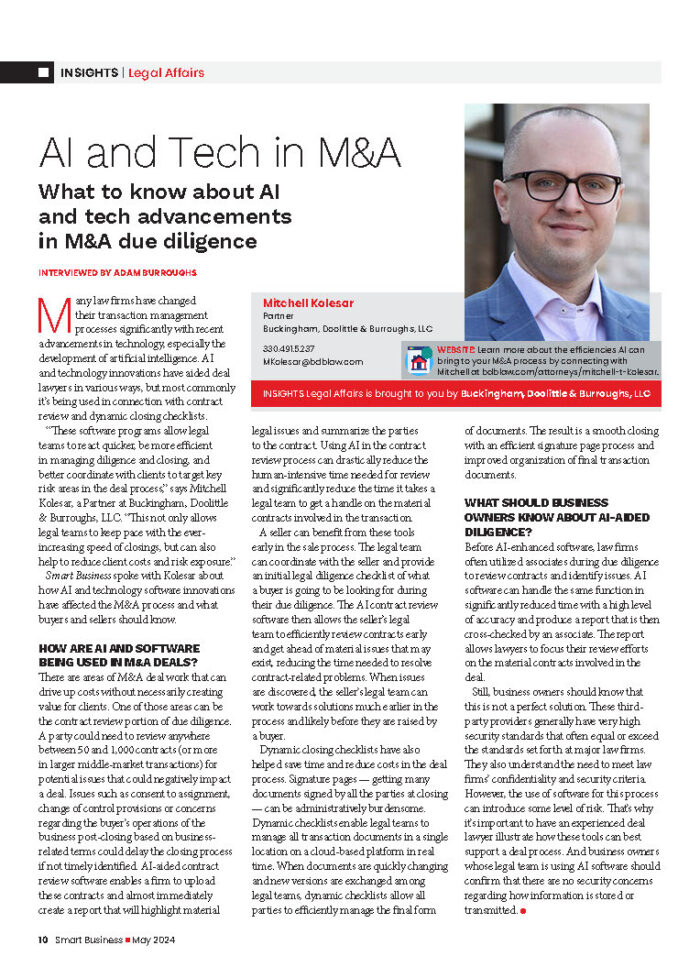

First published: May 2024 smart business.
Many law firms have made significant changes to their deal management processes with recent advances in technology, particularly the development of artificial intelligence. AI and technology innovations have aided transactional lawyers in a variety of ways, but are most commonly used in connection with contract reviews and dynamic closing checklists.
“These software programs allow legal teams to respond faster, manage diligence and closing more efficiently, and better coordinate with clients to target key risk areas in the transaction process. ,” said Mitchell Kolesar, partner at Buckingham, Doolittle & Burrows LLC. . “This not only allows legal teams to meet the ever-increasing speed of closings, but also reduces costs and risks for our clients.”
smart business We spoke to Kolesar about how AI and technology software innovations are impacting the M&A process and what buyers and sellers need to know.
How is AI and software used in M&A transactions?
There are areas in M&A transaction work that can increase costs without necessarily creating value for the client. One of those areas is the contract review portion of due diligence. Parties may need to review between 50 and 1,000 contracts (or more for large mid-market transactions) for potential issues that could adversely impact the transaction. Issues such as consent to transfer, change in control provisions, or concerns regarding the buyer's post-closing business operations under business-related terms can delay the closing process if not identified in a timely manner. AI-assisted contract review software allows companies to upload these contracts and generate reports almost instantly highlighting critical legal issues and summarizing the contracting parties. Using AI in the contract review process can significantly reduce the human time required for reviews, significantly reducing the time it takes for legal teams to understand the key contracts involved in a deal.
Sellers can benefit from these tools early in the sales process. The legal team can coordinate with the seller and provide an initial legal diligence checklist of what the buyer is looking for during due diligence. AI contract review software allows a seller's legal team to review contracts early and efficiently, pre-empting critical issues that may exist and reducing the time needed to resolve contract-related issues. It will look like this. If an issue is discovered, the seller's legal team can work on a solution much earlier in the process, perhaps before the issue is raised by the buyer.
Dynamic closing checklists also helped save time and reduce costs in the transaction process. Signature pages, or the task of getting all parties to sign many documents at closing, can be administratively burdensome. Dynamic checklists allow legal teams to manage all transaction documents in real-time in a single location on a cloud-based platform. When documents change rapidly and new versions are exchanged between legal teams, dynamic checklists allow all parties to efficiently manage the final form of the document. The result is a more efficient process on the signature page and better organization of final transaction documents for a smoother closing.
What should business owners know about AI-assisted diligence?
Before the introduction of AI-enhanced software, law firms often leveraged associates during due diligence to review contracts and identify issues. AI software can handle the same functions in significantly less time and with a higher level of accuracy, and generate reports that can be cross-checked by employees. This report allows lawyers to focus their investigation on the important contracts involved in a transaction.
Still, business owners should know that this is not a perfect solution. These third-party providers typically have very high security standards that match or exceed those set by large law firms. We also understand the need to meet law firm confidentiality and security standards. However, using software for this process can pose some risks. That's why it's important to have an experienced transactional lawyer explain how these tools can best support your transaction process. Business owners whose legal teams are using her AI software must also ensure that there are no security concerns regarding how information is stored or transmitted.
Click here to read the article.


